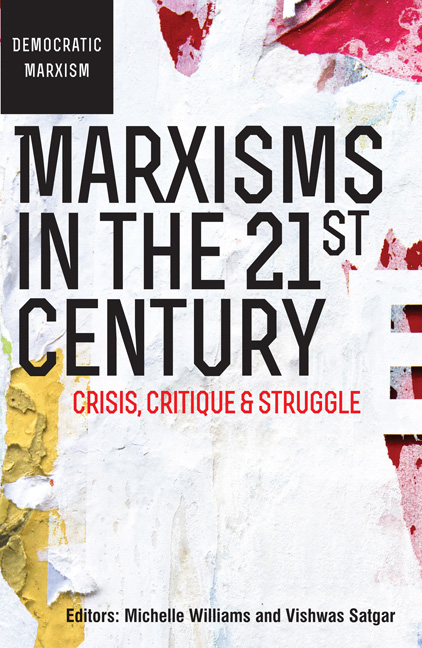Book contents
- Frontmatter
- Miscellaneous Frontmatter
- Acknowledgements
- Contents
- Acronyms and Abbreviations
- Introduction
- PART ONE DEMOCRATISING AND GLOBALISING MARXISM
- PART TWO MARXISM AND LEFT POLITICS
- PART THREE CRISES OF MARXISM IN AFRICA AND POSSIBILITIES FOR THE FUTURE
- Chapter 7 Retrospect: Seven theses about Africa's Marxist regimes
- Chapter 8 Socialism and Southern Africa
- Chapter 9 Uneven and combined Marxism within South Africa's urban social movements
- Chapter 10 Critical reflections on the crisis and limits of ANC ‘Marxism’
- Conclusion
- Contributors
- Index
Chapter 9 - Uneven and combined Marxism within South Africa's urban social movements
from PART THREE - CRISES OF MARXISM IN AFRICA AND POSSIBILITIES FOR THE FUTURE
Published online by Cambridge University Press: 21 April 2018
- Frontmatter
- Miscellaneous Frontmatter
- Acknowledgements
- Contents
- Acronyms and Abbreviations
- Introduction
- PART ONE DEMOCRATISING AND GLOBALISING MARXISM
- PART TWO MARXISM AND LEFT POLITICS
- PART THREE CRISES OF MARXISM IN AFRICA AND POSSIBILITIES FOR THE FUTURE
- Chapter 7 Retrospect: Seven theses about Africa's Marxist regimes
- Chapter 8 Socialism and Southern Africa
- Chapter 9 Uneven and combined Marxism within South Africa's urban social movements
- Chapter 10 Critical reflections on the crisis and limits of ANC ‘Marxism’
- Conclusion
- Contributors
- Index
Summary
The political dynamics of contemporary South Africa are rife with contradiction. On the one hand, it is among the most consistently contentious places on earth, with insurgent communities capable of mounting disruptive protest on a nearly constant basis, rooted in the poor areas of the half-dozen major cities as well as neglected and multiply oppressed black residential areas of declining towns. On the other hand, even the best-known contemporary South African social movements, for all their sound, lack a certain measure of fury.
In the face of the government's embrace of neoliberal social policies since shortly after the fall of apartheid, what are often called ‘service delivery protests’ occurring many thousands of times a year according to police statistics (Duncan and Vally 2008; Mottiar and Bond 2011) are at once the site of poor people's demands for greater responsiveness to human needs in general, but are also intensely localised and self-limited in their politics. The upsurge of protest since the late 1990s invariably invokes images of the anti-apartheid struggle and thus focuses analysis on continuities and breaks between the old anti-apartheid mass action and the new mass action in post-apartheid society. And yet the majority of community protesters operate in close interconnection with parts of the Tripartite Alliance, composed of the African National Congress (ANC), the trade union movement represented by the Congress of South African Trade Unions (Cosatu) and the South African Communist Party (SACP) and so the line between insurgencies and governing organisations is not always clear. Yet their geographic and political isolation from one another have contributed to their having little leverage over the Alliance, which notwithstanding some resistance by unions and communists, embraced neoliberal policies in the transition from anti-apartheid resistance to class-apartheid government in 1994.
But beyond the community protests, in many respects, the problems that have faced more traditional radical social movements in South Africa are familiar to students of social movements elsewhere: the problems of moving from movement to governing; of co-optation and shifting roles vis-à-vis the state; of the limits of localism and the problem of how to join communityand workplace-based organising to forge a strong working-class politics.
- Type
- Chapter
- Information
- Marxisms in the 21st CenturyCrisis, Critique & Struggle, pp. 220 - 259Publisher: Wits University PressPrint publication year: 2013



